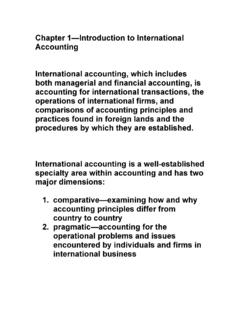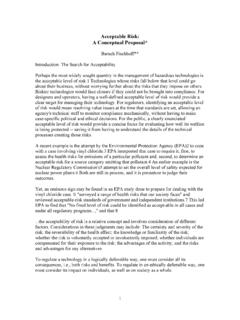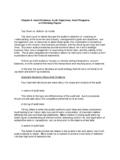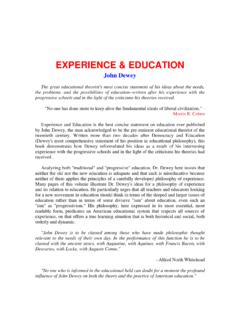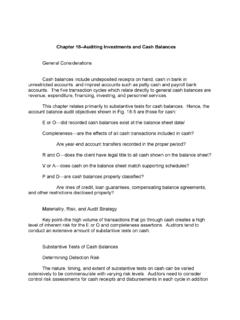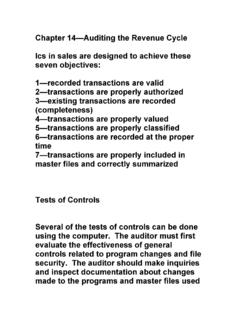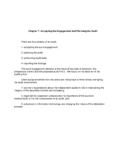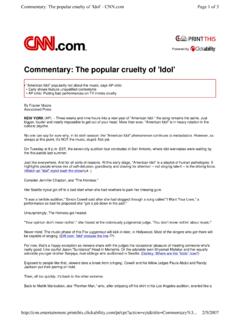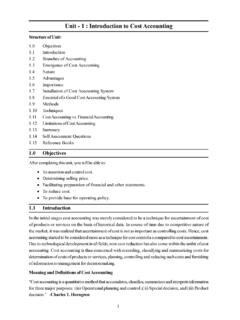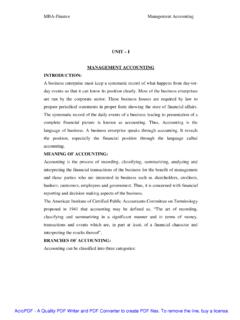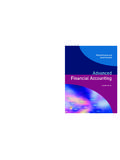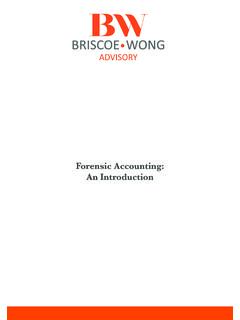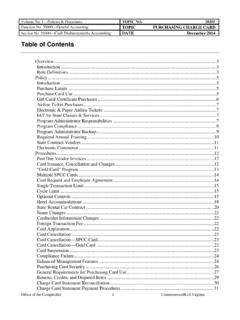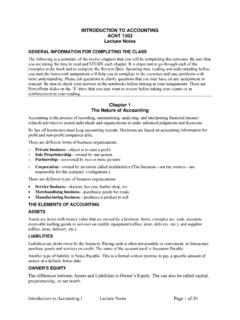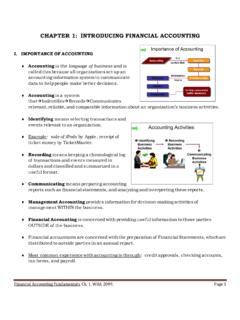Transcription of Chapter 1–Introduction to International Accounting
1 Chapter 1 introduction to International Accounting Accounting as a field of study in the is quite specialized and can be organized into two branches: financial and managerial. Financial Accounting provides financial information to groups outside the firm: stockholders, financial analysts, creditors, regulators, and the public. Managerial Accounting offers financial and operating information to the firm s management to help them with control, planning, and resource allocation. Specialty areas within financial Accounting are auditing and tax. International Accounting , which includes both managerial and financial Accounting , is International Accounting is a well-established specialty area within Accounting and has two major dimensions: Important Basic Concepts What is International business? It is any commercial activity that extends beyond one national boundary. It is a flow of goods, services, and capital from one entity in one nation to another entity in another nation.
2 The growth in world trade has been faster in the services sector than in the goods sector. Firms of many sizes are involved in International trade. Although the largest firms are often the most prominent, a significant level of economic activity takes place in the smaller firms. Between 40 and 50 percent of midsized firms export goods or services. A major reason for the recent increased emphasis on International Accounting has been the change in International trade during the last 50 years. Prior to the middle of the 20th century, the dominant theory of International trade was based on the classical economic theory of comparative advantage. This theory says each nation should offer goods and services that it can produce relatively efficiently and should export those goods. The nation should also import other goods. This theory assumed that the factors of production (land, labor and capital) were fixed nationally.
3 1 The factors of production, however, are mobile and when this was realized, International trade shifted its emphasis to International investment and financing. Today s multinational corporations (MNCs) are not simply or EU-based firms with a large volume of exports and imports; instead, they operate and raise capital in many different countries and in many International capital markets. This new character of International trade has created a whole host of new Accounting problems with which International Accounting must deal. The most important International Accounting topics are classified as follows: The outlook for the world economy contains both positive and negative factors. On the plus side are the sharply improving inflation rates in many developing nations and the reduction of energy costs (compared to the 1970s). On the negative side are the uncertain outlook for interest rates, concern about developing countries debt load, persistent unemployment in some nations, concern about the environment from the rapid development of some countries, terrorism, and integrating former communist countries into the world economy.
4 The Multinational Corporation Much International trade is conducted by a special category of entity, the multinational corporation. An MNC can be defined in a number of ways: scale of non-US operations, worldwide distribution of assets, nationality of owners, suppliers of capital and employees, and sources of profit. A true MNC is a world citizen and thus has no allegiance to any one particular nation as its headquarters or base of operations. The different attitudes of management toward International operations can be organized into three categories: 2 Various benefits can be achieved through the MNC: 1. Significant arbitrage benefits can be obtained through: a. exploitation of financing bargains b. reduction of taxes on financial flows c. the mitigation or shifting of risks to agents with a comparative advantage in bearing them d. diversification of cash flows received through foreign operations e.
5 The exploitation of various institutional imperfections f. the capturing and appropriation of information 2. Other benefits include capital availability, and a desirable cost of capital for a considerable range of its capital budget The MNC s objective is to maximize shareholder wealth, subject to environmental, regulatory and ethical constraints. The objective is sometimes difficult to achieve if managers decide to maximize their own utility functions. This is the agency problem, where the goals of shareholders conflict with those of the managers. The problem may be more frequent in the case of MNCs, where managers of different subsidiaries are more inclined to maximize the value of their respective subsidiaries. This problem calls for specific Accounting standards to deal with the unique pressures of accountability from domestic and foreign interest groups. Firms typically evolve into MNCs, and this process is shown below: Foreign Direct Investment Foreign direct investment involves the transfer of capital, managerial, and technical assets of a firm from one country to another by the same firm.
6 Firms engage in direct foreign investment and expand their markets by producing and selling broad. Some of the reasons include the following: 3 to reduce transportation costs lack of a domestic policy to achieve economies of scale in small-scale process technology to avoid trade or customer-supplied restrictions to follow customers and competitors to benefit from a different cost structure to achieve some vertical integration to rationalize production by taking advantage of varying costs of labor, capital, and raw materials to have access to production factors to take advantage of government investment incentives because of political motives to use a monopoly advantage over similar firms in foreign countries to have better profitability and stable sales and earnings. Various models and theories can be used to explain foreign direct investment. They include the International trade theory, the location theory, the investment theory, the theory of the firm, and the industrial organization theory.
7 Below is a summary of these theories: 4 The International Monetary System The International monetary system constitutes the structure within which exchange rates are determined, International trade and capital flows are accumulated, and balance-of-payments adjustments are made. The UN Monetary and Financial Conference held in Bretton Woods, in 1944, with the objective of developing an International monetary structure, created both the International Monetary Fund (IMF) and the World Bank. At that time, the fixed exchange rate system or par value based on gold and the US dollar proved inadequate and called for reform. Crisis in the International monetary system caused by an overvalued dollar and growing US balance of trade deficits, caused in December 1971 the convening of another conference that resulted in the Smithsonian Agreement and the devaluation of the US dollar.
8 A further devaluation of the dollar in 1973 showed the limits of the fixed rate system. From these crises there emerged the following exchange rate systems: 1. fixed rate system where the value of the currency is pegged to another currency, allowed to fluctuate only within very narrow boundaries 2. freely floating exchange rate system where the value of the currency is determined by market forces and not through intervention by government 3. managed-float exchange rate system where the value of the currency is allowed to fluctuate and governments intervene to insure the value does not move too much in a given direction. It is also known as a managed float or dirty float 4. pegged exchange rate system used by members of the EU to peg the value of their currencies to a basket of currencies, expressed in ECUs prior to the emergence of the EU single currency. The Euro was created by the various member nations currencies being irrevocably fixed with one another.
9 Global Capital Markets Perhaps the most important factor that has increased the importance of International Accounting is the emergence of a global capital market. The explosive growth in this market has been caused by the elimination of national capital controls, deregulation, improved communications, and disintermediation. Equity market capitalization as a percentage of gross domestic product during the late 1990s increased for many nations, primarily the developed nations. The number of domestic firms with shares listed in the late 1990s increased in some markets and decreased in others. Hundreds of foreign issuers have had their equity listed on the European, North American and Japanese stock exchanges for years. The number of foreign firms listed in most markets other than the NYSE and Nasdaq have been declining. Increasing numbers of foreign issuers are listing on Europe s exchanges.
10 Various benefits and costs are associated with listing on a foreign stock 5 exchange. The benefits of listing on a foreign stock exchange include: Given that the benefits outweigh the costs, a pressure exists for regulatory agencies such as the SEC to both protect investors with full disclosure requirements and yet attract foreign investment by increasing the competitiveness of their local stock exchanges through less costly disclosure requirements. 6 Accounting Standards for the MNC MNCs are faced with a diversity of Accounting standards to comply with. First, MNCs need to comply with the local standards of their country of origin, which will differ in some respect from the standards required in other countries. As a result, they need to be sensitive to the requirements of comparative International Accounting . Second, MNCs need to comply with the International Accounting standards set by the IASB, the International Accounting standard setting body.
